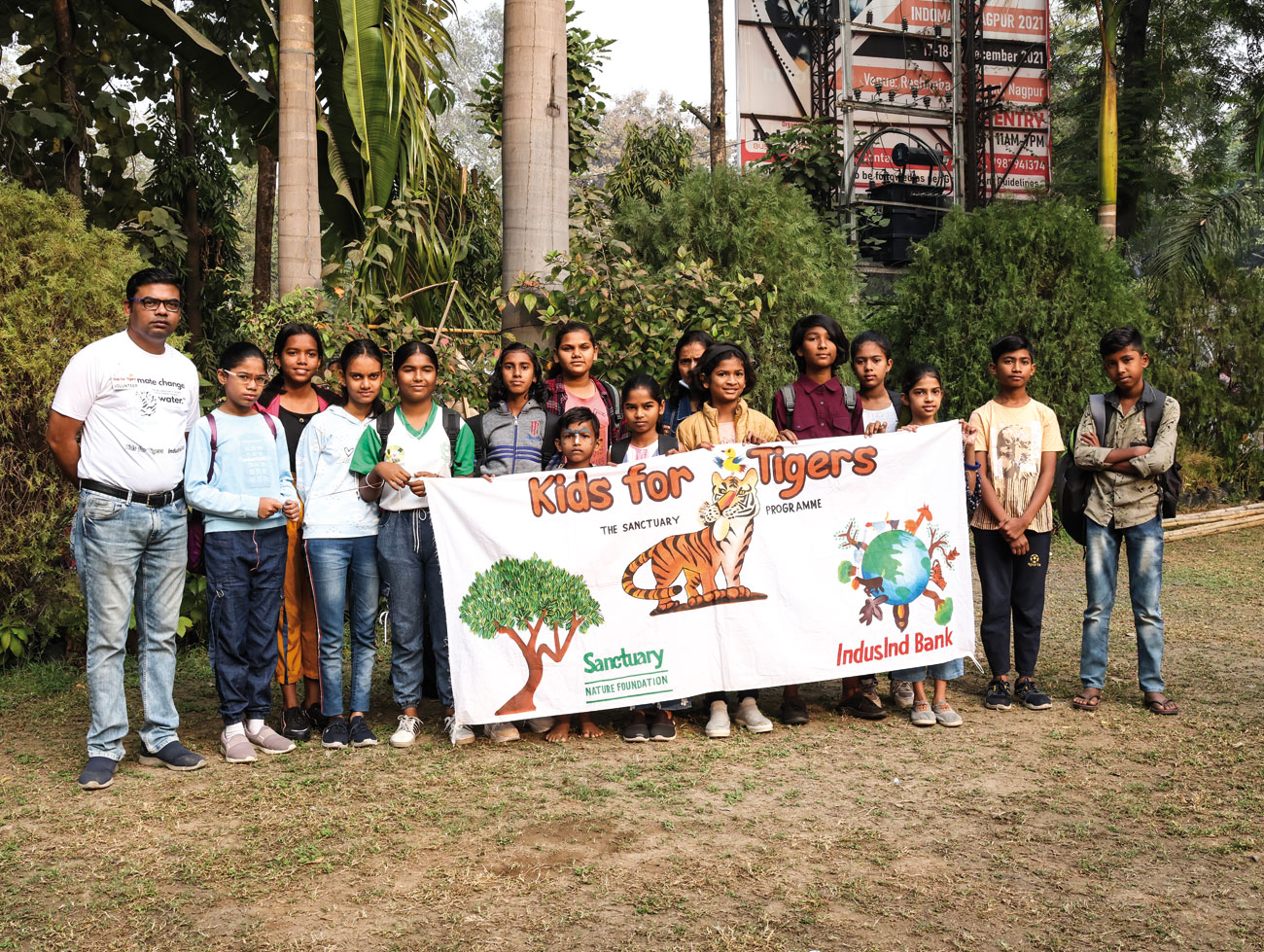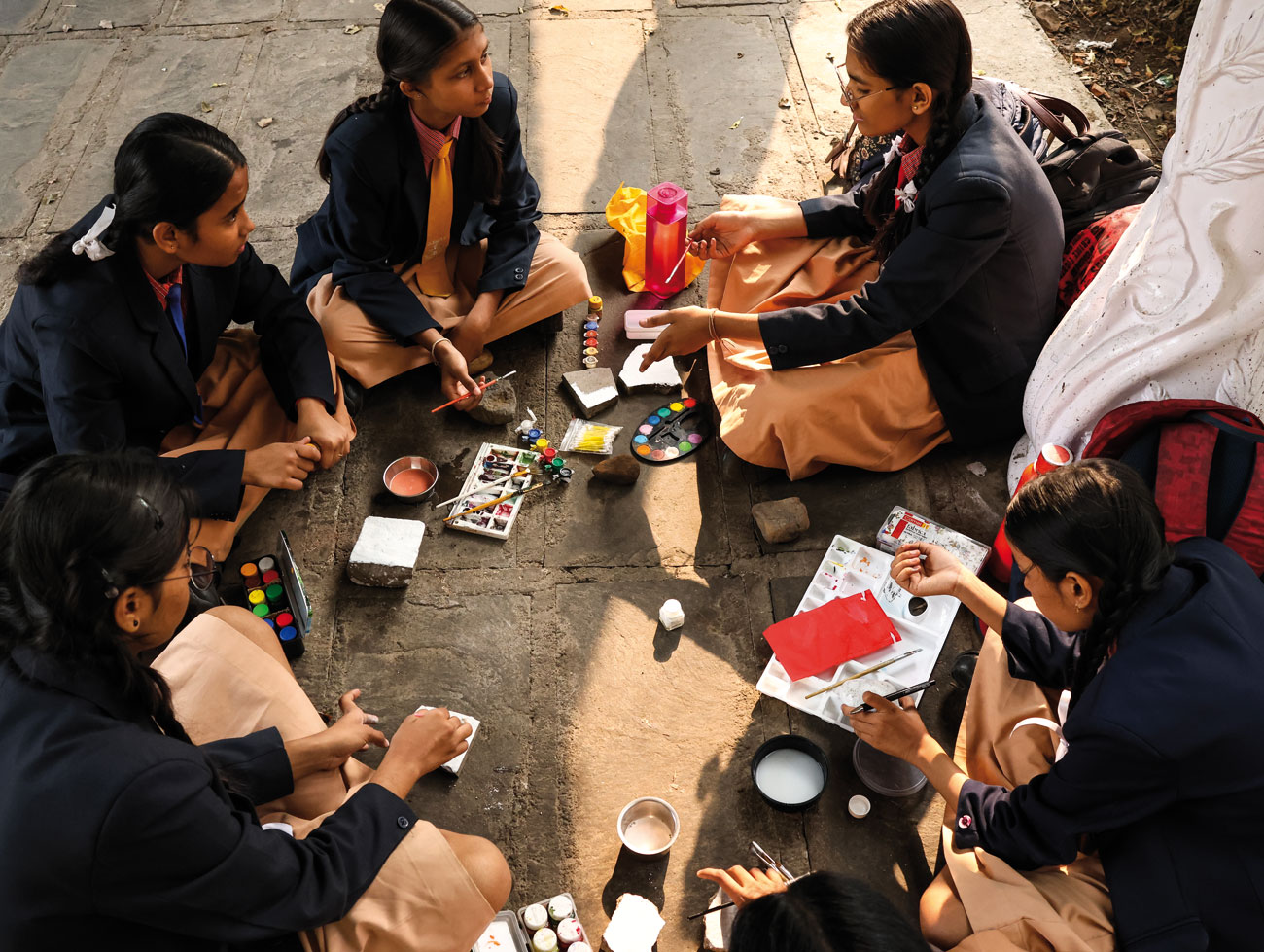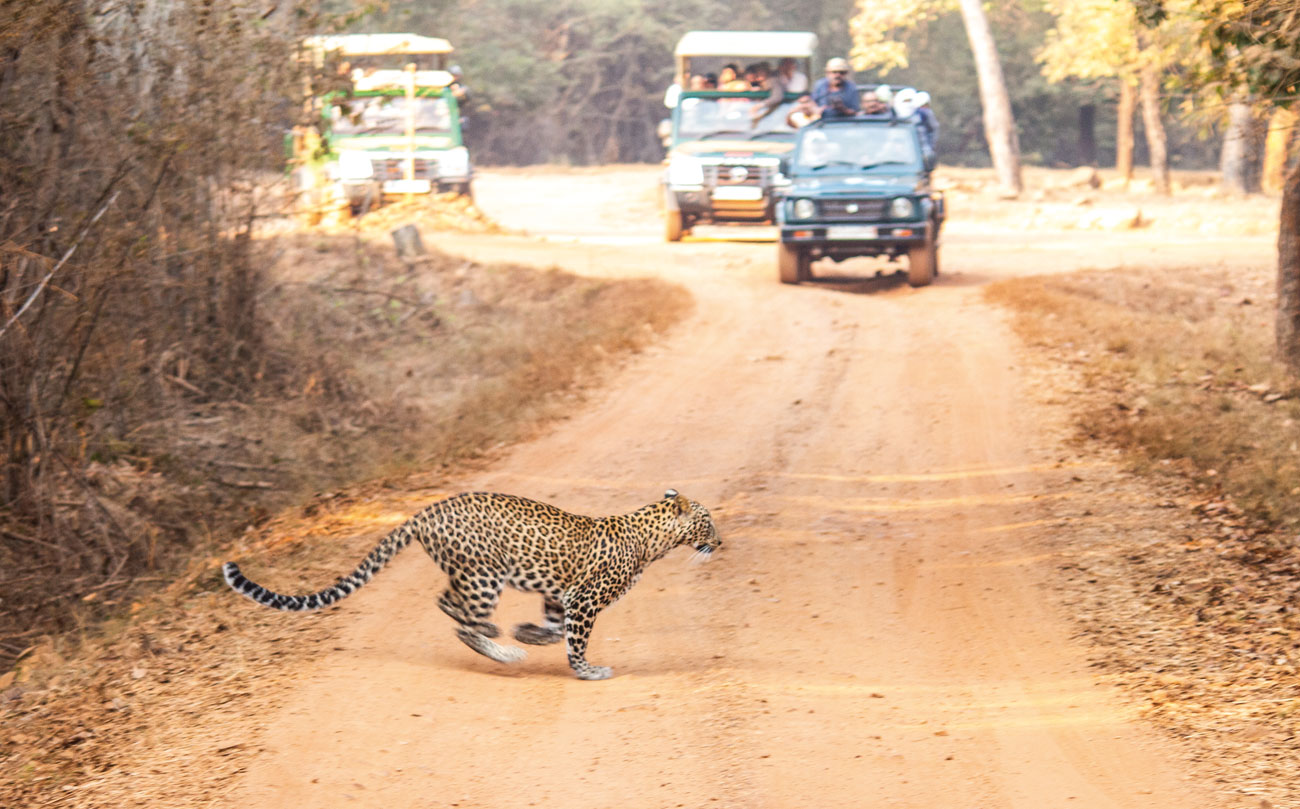Project Updates January-February 2024
First published in Sanctuary Asia,
Vol. 44
No. 4,
April 2024
A Sanctuary Report - January-February 2024
Notes, anecdotes and reports from Sanctuary Nature Foundation’s projects across the country.
Kids For Tigers
Kanha Tiger Reserve, Madhya Pradesh
Supported by The Corbett Foundation
The Kids for Tigers programme, supported by The Corbett Foundation (TCF) in the Kanha Tiger Reserve (KTR), envisions enrichment of the life of rural kids near the reserve through nature education. Twenty schools situated around the KTR periphery were selected for this programme, which included an interactive introductory presentation provided by Sanctuary about tigers and other biodiversity, threats to their existence and conservation interventions, and how kids can play a role in protecting the wilds. The TCF-Kanha team also presented a mini interactive session about Kanha’s wildlife and its habitat. The kids also enjoyed a documentary on tiger conservation and participated in several fun activities such as wall painting, colouring, face painting, craft making, a multiple choice quiz, and a nature walk along a nearby trail!
Bengaluru, Coimbatore, Delhi, Hyderabad, Nagpur and Panna
Supported by IndusInd Bank CSR
Kids For Tigers Camps
January and February were action-packed, with several camps and Tiger Fests for Kids for Tigers schools! The year began with Delhi’s Annual Kids for Tigers Camp in Ranthambhore on January 4-5, 2024, under the supervision of local coordinator, Neerajj Mittra. This transformative experience was offered to six promising students from Delhi/NCR, who were selected as Tiger Ambassadors; they were accompanied by mentor teachers. The itinerary included visits to Dastkaar, the Ganesha Temple, a museum, and an exhilarating jungle safari. The students were delighted to spot the Bengal tiger in its natural habitat. This was followed by interactions with Ranthambhore’s Wildlife Conservator Poonam Singh, and budding young wildlife photographer Nyra Singh. During this interactive session, students gained valuable insights into the world of wildlife conservation and photography.
Kids for Tigers Hyderabad held its annual camp for six Tiger Ambassadors and their teachers-in-charge at the Amrabad Tiger Reserve on January 28-29, 2024. Amrabad serves as a critical habitat for several wildlife species, including the Bengal tiger. The kids and teachers were thrilled to begin their safari with a glimpse of the Coppersmith Barbet, and a troop of macaques enjoying the emerald canopy. The students also visited a biolaboratory, where they observed preserved specimens of rare species.
A scientist, Dr. Swetha’s passion and commitment for nature protection inspired the kids. She particularly focused on the impact of habitat destruction on species such as the pangolin and Indian civet. A team from the Amrabad Forest Department provided an overview of their work, achievements and importance of projects such as installation of solar pumps to supply water to dry waterholes in hilly areas in the summer, and providing salt licks for wildlife. A two-hour nature trail was the highlight with participants reminded of the delicate balance maintained in nature and our role in the web of life.
The Coimbatore Annual Camp, organised by local coordinator Mohammed Saleem at the Nilgiri Biosphere Nature Park on February 26-27, 2024, was an enlightening experience for the Tiger Ambassadors. After an educational birding session, a sighting of the elusive Yellow-rumped Flycatcher showcased the region’s rich and unique avian diversity. Watching the Oscar award-winning documentary Elephant Whisperers set the stage for a nighttime trek. Equipped with headlamps from the Tiger Ambassador kits, the group encountered chital, and learned about nocturnal wildlife. The next day began with a hilltop trek, offering mesmerising views and reinforcing the students’ connection with the park’s topography. A stream walk and adventure games provided hands-on experiences in understanding ecosystems. The camp’s rich educational content emphasised the importance of wildlife conservation.
All camp participants from Delhi, Hyderabad and Coimbatore received certificates and Tiger Ambassador kits, but importantly, benefitted from a wealth of knowledge from experts and gained a newfound understanding of wildlife conservation.
Tiger Fests
Kids for Tigers conducts Tiger Fests in each participating city, a mega-celebration that brings together students, teachers and parents to highlight what they have gained through the programme. On January 6, 2024, Baavan, in conjunction with Kids for Tigers led by local coordinator Deepak Ahirwar, conducted a wonderful Tiger Fest at the Pattan Government Middle School in Chhatarpur district, Panna. The fest was dedicated to celebrating the environment while concurrently fostering awareness about pressing conservation issues. The Chaurasia (KP) Foundation that has been active in upgrading the school and houses of Pattan, was also an active participant. The NGO Samavesh, involved in educational work in Panna, not only demonstrated the absorbing way they impart science education in schools, but also showcased organic farm seeds. Students from middle schools in Madla, Rajgarh and Baharpura also participated, along with several enthusiastic volunteers. Despite the rough weather, a large audience gathered to appreciate the enchanting and educative mime acts, plays and songs. A sunny day in spite of the dark clouds and rain! The day concluded with certificate distribution and inspiring interactions with Sanctuary’s Bittu and Madhu Sahgal, and Baavan’s Dr. Raghu Chundawat and Joanna Van Gruisen.
On January 19, 2024, more than 250 students and 34 teachers from 12 schools in Bengaluru enthusiastically participated in the Kids for Tigers Fest held at Bal Bhavan. The festival was organised by Bengaluru Coordinator Mamlakatoi Haidarova. This year’s fest was centred around the theme ‘Project Tiger – The Next 50 Years’. The event commenced with an inaugural address by renowned wildlife photographer and filmmaker Kalyan Varma. It provided a platform for students and teachers to contemplate conservation efforts, combating climate change, and advocating for the sustainable coexistence of all species on Earth.
Another eagerly-awaited Kids for Tigers Tiger Fest was held in Coimbatore on January 20, 2024, at Chandrakanthi Public School. With the enthusiastic involvement of more than 400 students from 15 schools, the event proved to be a dynamic platform for fostering creativity, eco-consciousness, and a sense of community. Samskaara Academy, a green campus built in a style inspired by sustainable architect Laurie Baker, received the prestigious Green School Award, acknowledging their commitment to environmental sustainability.

A group photo from the Nagpur Tiger Fest held on February 1, 2024 at the India Peace Centre. A total of 353 students, 25 teachers, over 50 parents and 25 volunteers attended the fest, making it a resounding success. Photo: Sanctuary Photolibrary.
The Nagpur Annual Tiger Fest, held on February 1, 2024, at the India Peace Centre in Nagpur, was a landmark event that brought together a diverse group of enthusiastic students from various schools. A total of 353 students, 25 teachers, over 50 parents and 25 volunteers attended the fest. An enlightening Audio-Visual session, aligned with the Kids for Tigers 23-24 theme, was conducted. Subsequent sessions focussed on bird identification and a nature trail, providing an interactive experience to deepen the participants’ understanding of the microfauna in their surroundings.
These Tiger Fests held in different cities were a resounding success, showcasing not only the talents of participants but also serving as a platform for learning, expression, and a collective commitment to a positive and eco-conscious community. The emphasis on environmental themes highlighted the importance of conservation and sustainability, making them a truly enriching experience for all.

Students enjoying an art session during the Nagpur Tiger Fest. Expressing their creativity through nature-themed art helps children connect with the environment. Photo: Sanctuary Photolibrary.
Mumbai, Maharashtra
Supported by Anant Bajaj Paryavaran Mitra and Bajaj Electricals CSR
As winter turned to spring, the Kids for Tigers National Camp at the Tadoba National Park from February 1 to 3, 2024 brought together enthusiastic students from diverse Mumbai schools, under the guidance of experienced field coordinators, park guides, and naturalists. The distinguished team of instructors included Hans Dalal, Dr. Parvish Pandya, Saurabh Sawant, Govardhan Meena, Prachi Galange and Nishita Kanojia. Five tiger ambassadors were selected from 36 schools for the Camp.

The Kids for Tigers Annual Camp for Mumbai students was held at the Tadoba-Andhari Tiger Reserve from February 1 to 3, 2024, gifting the Tiger Ambassadors with some incredible sightings of a tiger, sloth bear, and much more, including this stunning leopard! Photo: Prachi Galange/Sanctuary Photolibrary.
On the first day, local resident-turned-Forest Department guide Ajay Kodape led the trail through the interpretation centre, butterfly garden and his own ecovillage, Agarzari. Ajay had deep insights to offer on the biodiversity and the impact of tourism on villagers. The butterfly garden developed by the locals offered a great opportunity for students to observe butterfly eggs and understand its life cycle. The evening featured an engaging session by Dr. Parvish Pandya and Saurabh Sawant. A bonfire and talk by Hans Dalal and Ajay Kodape provided an introduction to Tadoba and ongoing conservation efforts.
The highlight of the second day was an early morning safari starting at Devada Gate, providing a unique opportunity to witness Tadoba’s rich wildlife, which included a close sighting of a tigress! Participants also observed varied birds including the Yellow-footed Green Pigeon, Grey Junglefowl and Asian Openbill. Dr. Pandya also conducted a camp diary writing session that introduced kids to the habit of recording experiences and sightings in a detailed manner. The next day began with a safari from the Khutwanda Gate that resulted in amazing sightings of a leopard, sloth bear, grey mongoose, sambar, chital, wild pig, and birds such as the Oriental Honey Buzzard and Pied Kingfisher.
Back in Mumbai, on February 9, 2024, the Coastal & Marine Biodiversity Centre in Airoli, Navi Mumbai, hosted a Flamingo Watch event for a significant gathering of students and teachers from several Mumbai schools. The event aimed to educate participants on the importance of mangroves and wetlands in urban landscapes and provide a captivating experience of observing migratory birds, particularly flamingos.
_C-1300_1712312794.jpg)
Participants enjoyed views of flamingos, waders and mangroves during the Flamingo Watch held at the Coastal and Marine Biodiversity Centre in Airoli, Navi Mumbai, on February 9, 2024. Photo: Sanctuary Photolibrary.
Participants took a boat ride followed by a mangrove walk, and visited the interpretation centre. The boat ride provided a great experience for students and teachers and it was heartening to see their awed expressions on seeing thousands of flamingos with their pink wings creating a stunning contrast against the backdrop of the green mangroves. In addition to flamingos, participants also observed various other waterbirds, including Common Redshank, Black-headed Ibis, Black-winged Stilt, Common Sandpiper, Black-tailed Godwit, Northern Shoveler, Black-headed Gull, and more. A short walk at the mangrove nursery allowed participants to learn about different mangrove species and their role in combating climate change.
Kolkata and Sundarban
Supported by H T Parekh CSR
A cohort of 32 students and their teachers from seven fringe schools participated in a nature trail in the Sundarban Tiger Reserve on February 2. The expedition was led by naturalist Nityananda Choukidar, along with the coordinators of Bagh Sankalp, Joydip and Suchandra Kundu. During the day-long trail, participants immersed themselves in the unique surroundings of the mangrove park, engaged with the foresters, and also explored the reserve’s creeks and channels, encountering an array of wildlife, including varied bird species, crocodiles, chital, wild pigs, and monitor lizards. Each participant was equipped with a notepad and pen to document their observations, fostering hands-on learning. Notably, a significant number of attendees were visiting the tiger reserve for the first time, a rare opportunity for them to connect with their inherited landscape.
The programme also conducted its second Art for the Wild awareness campaign that garnered an impressive 3,200 artworks from 89 schools across Kolkata, Howrah, and the suburbs. A distinguished panel of five senior artists were involved in selecting 190 artworks for the exhibition. The six best pieces, selected by a panel, were honoured with awards.
_C-1300_1712313053.jpg)
Kolkata kids attended a nature trail at the Chintamani Kar Bird Sanctuary on February 13, 2024, spotting stunning butterflies, orchids and ferns, among other endemic flora and fauna. Photo: Sanctuary Photolibrary.
The third and fourth art camps were conducted on January 1, 2024, at Bagh Bon, the multipurpose community resource centre of SHER, with 148 participants from nine areas of Pakhiralaya and Rangabelia. The Deputy Range Officer of Sajnekhali Wildlife Sanctuary Abhishek Day and forester Partha Halde awarded prizes to the eight best works from the two groups, and certificates to all. A film on the reserve was also screened on Bagh Bon’s smart-board.
The final art camp graced by Sanctuary’s Bittu and Madhu Sahgal, was held at Bagh Bon on February 11, 2024, with 81 participants from Dayapur.
When children are encouraged to express themselves through drawing and painting, it not only unleashes their creativity but also instils conservation values. Through their artwork, children communicate and convey a heartfelt desire for a better world, leaving a lasting impact on both the younger generation and their elders.
On January 25, 2024, a Kids for Tigers Teachers’ Environmental Leadership Workshop was conducted at Bagh Bon, with 49 teachers representing 18 forest fringe schools. The session was led by campaign coordinators Joydip and Suchandra Kundu, who inaugurated the workshop with an introduction to the Bagh Sankalp initiative. Participating teachers shared their experiences, and expressed a keen interest in collaborating with the campaign.
Ninety-four educators from 52 schools participated in the Kids for Tigers Teachers’ Environmental Leadership Workshop at the Nehru Children’s Museum on January 30, 2024. Apart from coordinators Joydip and Suchandra Kundu interacting with the participants, Professor Anindita Majumdar of Netajinagar College for Women, an ecologist, made an interesting presentation on the urban ecosystem and the role of educators in sensitising students. Indranil Banerjee, photo documenter of macro subjects, presented a slideshow of his work. Teachers shared their own experiences and issues relating to use of single use plastics, junk food, etc. were also discussed.
A capacity building session for journalists on the media’s role in environmental education was organised at the Bagh Bon Centre on February 25, 2024, as part of the Bagh Sankalp campaign, with participation from 33 regional correspondents from the South 24 Parganas of various print, electronic and digital media houses. The objective was to raise awareness among local reporters about the vital connection between the Sundarban’s iconic wildlife and habitat, and the survival and well-being of its inhabitants.
_C-1300_1712313150.jpg)
Kids for Tigers Kolkata Coordinator Joydip Kundu addresses 94 educators from 52 schools, who participated in the Teachers’ Environmental Leadership Workshop at the Nehru Children’s Museum in Kolkata on January 30, 2024. Photo: Sanctuary Photolibrary.
Journalist attendees gained insights into the importance of media coverage not only for flagship species such as the tiger but also for lesser-known species, the detrimental impact of fake news on long-standing human-wildlife coexistence dynamics, and much more.
The meeting emphasised the imperative for collaborative efforts among government entities, non-governmental organisations (NGOs), researchers, and journalists. The objective is to collectively educate the general public about the significant environmental threats that loom large. By uniting their expertise and resources, these stakeholders can effectively raise awareness about pressing environmental issues, mobilise support for conservation initiatives, and inspire proactive measures to address emerging challenges. This united approach recognises the interconnectedness of various sectors in tackling environmental issues and underscores the importance of collective action in safeguarding the planet for current and future generations.





_C-1300_1712312794.jpg)
_C-1300_1712313053.jpg)
_C-1300_1712313150.jpg)